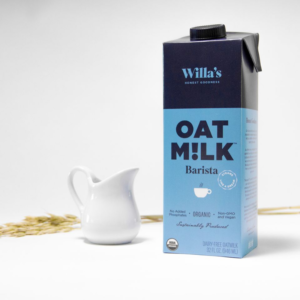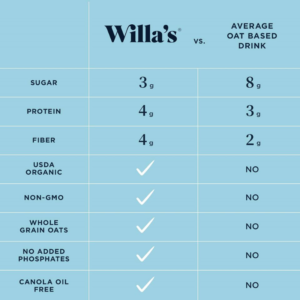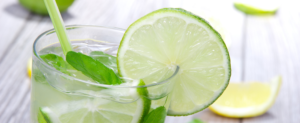Humans have been drinking cow’s milk for over 7,500 years – making it one of the longest foods continuously consumed throughout history. But, as consumer’s tastes change, the market for non-dairy alternative milk such as soy and almond milk has increased. One type of alternative is oat milk, favored by consumers looking for a vegan and/or low-calorie beverage option, which is estimated to reach $490m in value by 2026.
So when sisters Christina and Elena went searching for the perfect oat milk, they were disappointed that they couldn’t top their beloved Grandmother Willa’s recipe. Instead of keeping Grandma’s oat milk to themselves, they decided to found Willa’s Kitchen and share their unique beverage recipe with the world. Unlike other oat milk, Willa’s oat milk steams just like regular milk, has no added phosphates, is produced sustainably, and does not overpower the coffee.
But turning a tradition into a beverage business is more complicated than handing over a family recipe to a processing facility. When the sisters took their beverage to a food scientist, they ran into problems that the scientist could not solve: namely, balancing the flavors to make it ideal for mixing with coffee. They reached out to several other experienced food scientists only to be disappointed again. “Based on our conversations with food and beverage scientists,” Christina said, “we weren’t convinced there were solutions to our challenges.”
Like many beverage entrepreneurs, the sisters needed to clear several hurdles before they could bring their beverage product to market. There are three important aspects to perfect before the product hits the shelves: labeling, shelf life, and scalability. Labeling involves getting the correct ingredients together to ensure your product fits your goals- for Willa’s Kitchen, which meant ensuring the ingredients were vegan, lactose-free, and made with whole ingredients. Next, when a recipe is turned into a product, you must discover the shelf life of the product and how the product’s quality is affected over time. And finally, scalability is the ability of a product to be produced on a massive scale.
Willa’s Kitchen turned to WiseBev’s services targeted at beverage entrepreneurs like themselves. As a plant product made to mimic the taste and function of milk, ingredient choice would be critical to complete the enzyme process of breaking down starches. In a few days, head food scientist Lindsay Wisener was able to solve beverage problems that had been dogging the company for months.
“Another challenge was overcoming some off-flavors that were coming from the oat raw materials,” Wisener said. “We did a fair amount of work to balance the flavors and complement the coffee.” In addition to helping Willa’s Kitchen address some critical formula issues, WiseBev also connected them with new partners and beverage co-packers.
Today, Christina and Elena’s family recipe is now being sold online and will soon be featured in numerous coffee shops. Willa’s Kitchen and WiseBev are continuing to collaborate on more variations of the beverage product.
Looking for help with your beverage recipe? Contact us to see how our rapid feasibility package can help.









